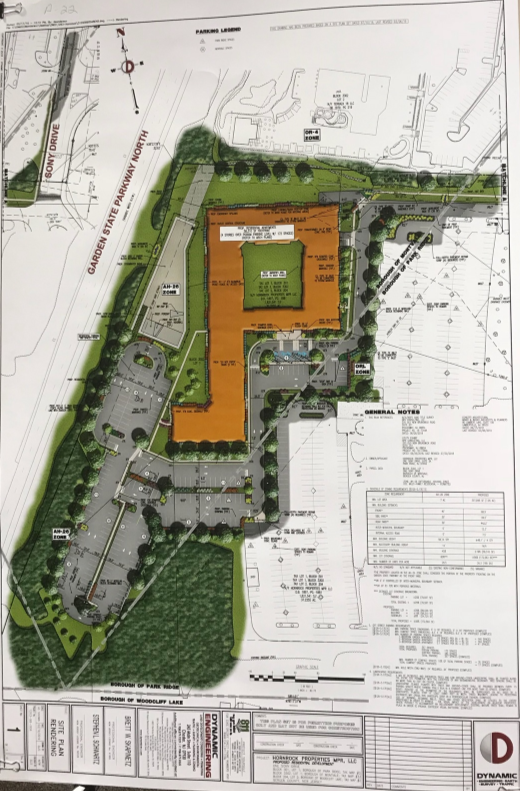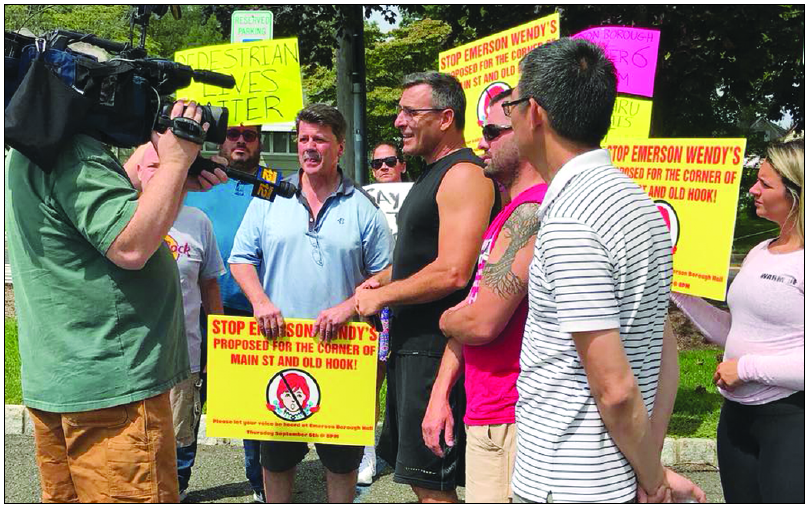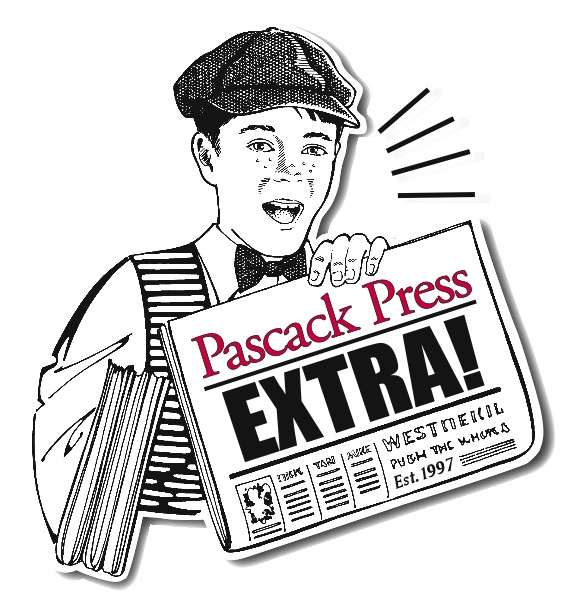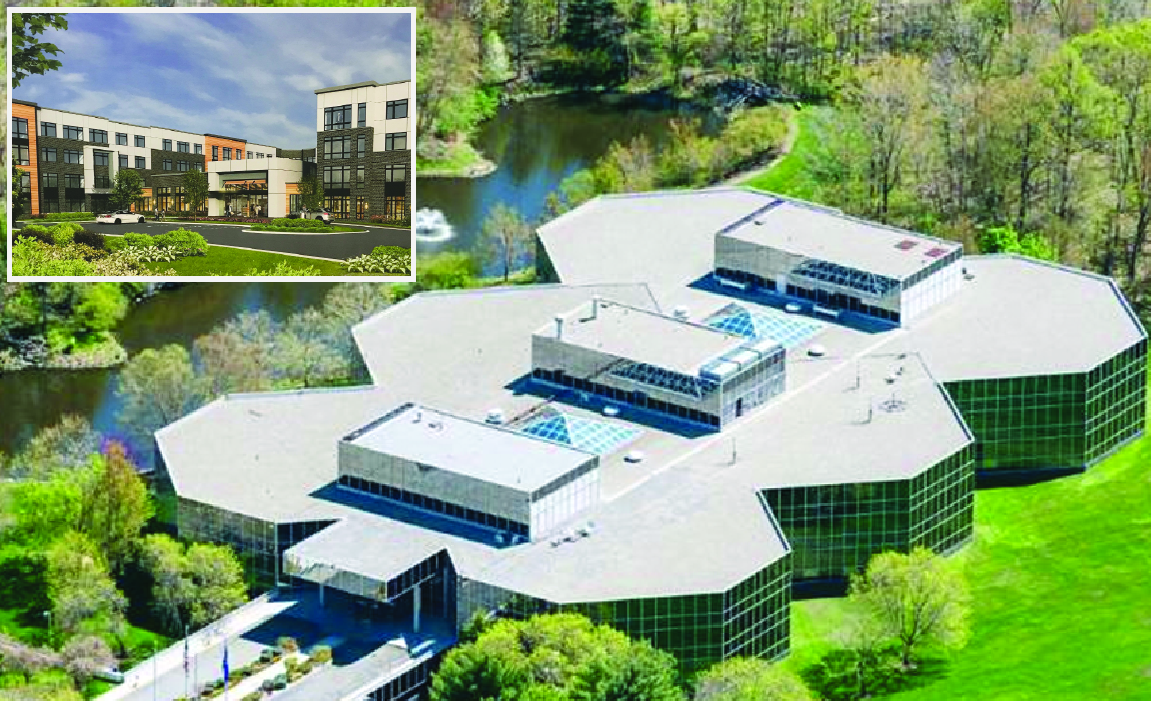
BY MICHAEL OLOHAN
OF PASCACK PRESS
PARK RIDGE/MONTALE, N.J.—Both Montvale and Park Ridge welcome 2019 with public hearings on a developer’s applications for the same proposal: to build a 185-unit multifamily development in Montvale, a key part of Montvale’s affordable housing settlement.
Montvale’s Planning Board meets Wednesday, Jan. 2, 2019 at 7:30 p.m. for its first hearing on preliminary and final site plans for Hornrock Properties’ 185-unit development at 1 Sony Dr.
Meanwhile, Park Ridge’s Zoning Board of Adjustment will hear Hornrock’s proposal to build an access road in adjoining property in Park Ridge for the multi-family development in Montvale.
Hornrock had asked Park Ridge to rezone the Sony Electronics campus to allow for an additional 555 units there, but the Borough Council declined in 2015. The borough is negotiating its affordable housing plan, with Hornrock participating, in ongoing proceedings expected to reconvene Feb. 15, 2019.
Throughout 2018, the mayors of Park Ridge and Montvale spoke out against the way affordable housing is forced on suburban towns.
At a heated state hearing in July, mayors Keith Misciagna of Park Ridge and Michael Ghassali of Montvale contended that the current Superior Court-controlled process leads to high-density housing and “overdevelopment.”
After recent negotiations, Montvale will be building 615 new housing units—105 to be affordable units—while Park Ridge has submitted a settlement plan that has not yet been approved.
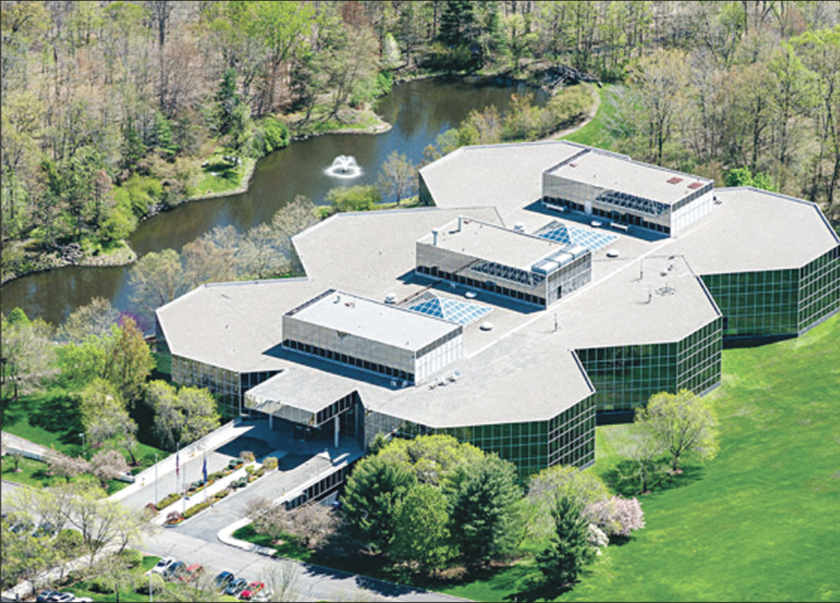
Tensions flare
At the July session, Fair Share Housing Center’s Executive Director Kevin Walsh called both mayors’ communities—along with three other mayors who testified—“racist,” based on their low percentage of black residents, or approximately 1 percent in both Park Ridge and Montvale.
Fair Share Housing Center is an intervenor in most statewide affordable housing settlements. Walsh prefaced his charges of racism by noting suburban towns have historically used zoning laws to also keep out people with disabilities, as well as black and Hispanic families.
A mayor pushes back
Ghassali recounted his experiences riding to and from the July legislative hearings with Misciagna and his experience when their towns were labeled as “racist” by Walsh, taking offense to the characterization, rebuffing his accusations on public television and drafting an August letter.
In his letter to Walsh, Ghassali said the borough “has consistently satisfied its affordable housing obligations” and while he agrees towns have “a constitutional obligation to provide their fair share of affordable housing, the manner in which municipalities’ affordable housing obligations are being determined and administered is costly and inefficient for all parties involved.”
“Affordable housing is not and never has been an issue for only specific minority groups; it is an issue for all economically-disadvantaged residents in this state,” wrote Ghassali to Walsh. “[Montvale] will affirmatively market its affordable units, as required by law, but will have no control over who occupies those units—as you well know.
“My opposition to this process has nothing to do with race and everything to do with non-functioning bureaucracies and the delegation of this issue to a court system that is ill-equipped to handle it,” Ghassali wrote.
‘Too much power’
Ghassali wrote the court process provides “far too much power and influence to for-profit developers and interest groups, to the detriment of communities and their residents.”
He said Walsh’s “singular focus on one statistic about the black population was misleading and was clearly intended to disparage Montvale to score political points.”
New Jersey’s 1985 Fair Share Housing Act—passed in response to the New Jersey Supreme Court’s landmark Mount Laurel decision in 1975—mandated that municipalities allow for the reasonable creation of affordable, or income-restricted, housing.
The Fair Share Housing Act created the state’s Council On Affordable Housing, or COAH, which oversaw two rounds of affordable housing before it ceased to function under Gov. Chris Christie.
With COAH defunct, the state Supreme Court in 2015 directed oversight of affordable housing obligations to be transferred to the state’s Superior Court, where it had been prior to 1985.
Municipalities are not required to have a court-approved housing plan, but without such are open to a possible “builder’s remedy” lawsuit that might permit high-density housing as “inherently beneficial,” regardless of local zoning rules. A “builder’s remedy” suit might allow multifamily housing units if a judge finds a town is not in compliance with New Jersey’s “fair share” affordable housing law.
Affordable housing obligations are often met with “inclusionary development,” which generally allows builders to construct four market-rate housing units for every one affordable unit. Local officials contend this provision leads to “overdevelopment” and have strongly opposed this so-called “builder’s remedy” mechanism.
A hybrid solution?
Following a mayors’ meeting in October, Misciagna offered possible future solutions.
He said in the future affordable housing obligations will likely be settled by “a hybrid” of solutions such as rehabilitating existing housing and an updated version of regional contribution agreements, allowing communities to transfer up to 50 percent of affordable housing obligations by financing housing stock improvement or building in urban areas.
Regional contribution agreements were outlawed in 2008 by the state Legislature because they were believed to be another way to keep poor, often minorities, out of wealthier towns.
‘Losing the argument’
Misciagna said he told July’s Assembly hearing “if we keep letting all of our corporations leave, we’re all going to need affordable housing because we’re all not going to have jobs. Because you lose something like Sony…when that goes it’s a ripple effect,” said Misciagna. “That’s the same thing that’s happened up here.”
Asked about Walsh’s racist characterization of Park Ridge, he said “he [Walsh] was going to lose the argument on affordable housing and whether it should be handled the way it was…and so he changed the argument…His argument was the United States has a racism issue…but that has nothing to do with affordable housing,” said Misciagna.
Fair Share Housing Center spokesman Anthony Campisi said that Walsh did not respond to Ghassali’s letter defending Montvale because he did not believe it would make any difference in changing Ghassali’s views.
“He’s [Ghassali] upset with having to implement zoning reforms that will include working families, who are disproportionately African American and Latino,” said Campisi. He noted “the check on their [Montvale’s] discriminatory zoning is the Mount Laurel doctrine.”
Campisi said towns like Montvale have used zoning to exclude minorities and low-income families “and Mayor Ghassali’s contention that the town has decayed or been destroyed or overdeveloped as a result of their affordable housing settlement is bizarre.”
Several Republican-sponsored bills that are still in committee seek various remedies. These include proposals to:
• Shift housing obligations from municipalities to the state;
• Eliminate so-called “builder’s remedy” lawsuits that allow developers to sue a municipality that does not get a court-approved housing plan;
• Amend the state constitution to prohibit municipalities from engaging in exclusionary zoning;
• Define which towns must provide inclusionary zoning and set mandated affordable housing at 10 percent of units, not 20 percent of units; and
• Eliminate the current exclusions from affordable housing obligations that such cities as Newark currently enjoy.
On Oct. 11, Benjie Wimberly, Assembly Housing and Development Committee chair who held hearings on affordable housing, met with Misciagna to tour Park Ridge’s future affordable housing sites.
Misciagna said Wimberly appeared “very open-minded” about making future obligations regional and not local, “re-establishing COAH in some form,” and heard his opposition to “builder’s remedy” lawsuits.
Misciagna said he wished he’d met with Wimberly two years ago. He said he told him that affordable housing should be located downtown, per the current borough plan, to access transit, shopping, and jobs, and not located away from such vital services, such as where Hornrock proposes on the Sony property.
Future 2019 meetings on the affordable housing process in New Jersey are being planned, Wimberly said.

